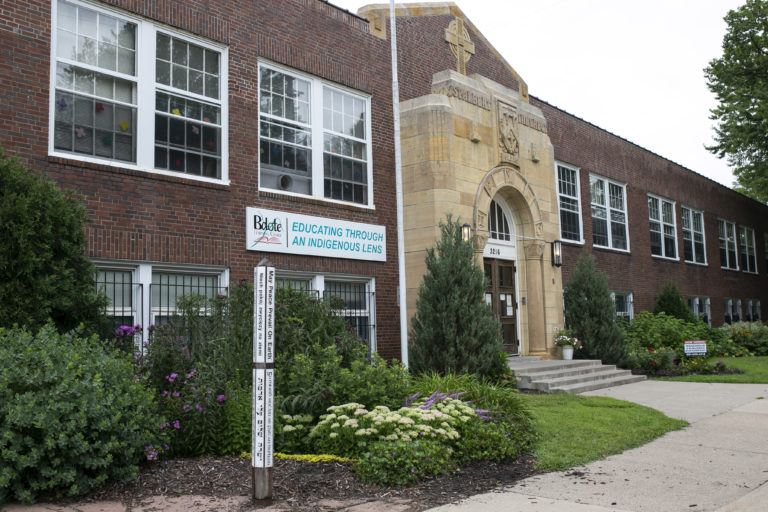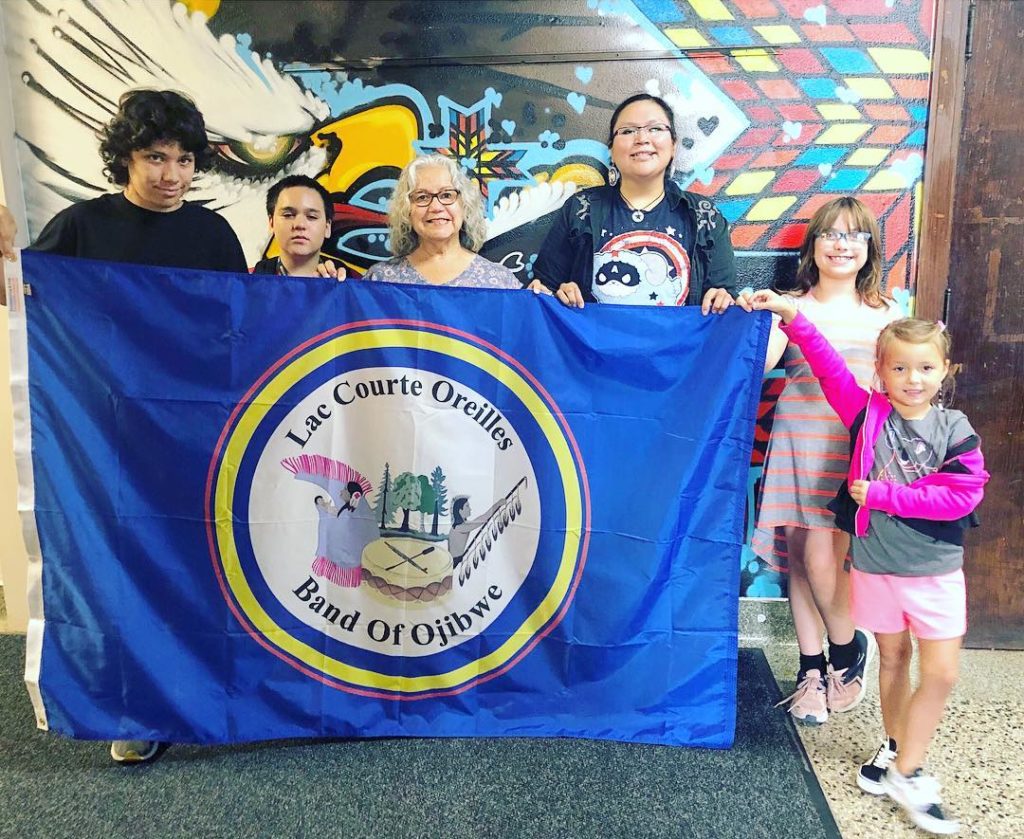Bdote Learning Center

“Bdote” is the Dakota word for two waters coming together. In Minnesota, it refers to the sacred site where the Mississippi and the Minnesota Rivers join, which is believed to be the origin of Minnesota’s first peoples. Bdote Learning Center adopted the word as a metaphor for its work of bringing together the best of Native and western knowledge while addressing the urgent need for indigenous language restoration. It is the only dual-Native language immersion school in the United States; about 80-90% of teaching there happens in Dakota or Ojibwe.
“Without these efforts, our languages are lost, our culture is lost. Who are we as people if we don’t speak our own languages?”
Dr. Cindy Ward-Thompson, Director of Administration, Bdote Learning Center
Indigenous Language Restoration
Bdote Learning Center’s director of administration, Dr. Cindy Ward-Thompson, feels the urgency of the work happening at this K-8 school, located in Minneapolis and on what was Dakota land. “This is it. This is the end,” she underscored. “Without these efforts, our languages are lost, our culture is lost. Who are we as people if we don’t speak our own languages?” Dr. Ward-Thompson cited that only a couple of fluent Dakota first speakers remain in Minnesota, and there are only a few hundred Ojibwe first speakers still alive.
Since launching in 2014, the school has made meaningful progress. Last year it had a student test at the lowest level of fluency in Dakota. It plans to keep adding more fluent speakers. At Bdote Learning Center, about 70% of the staff identify as indigenous, and it includes members of the Dakota and Ojibwe Nations as well as staff from Ho-Chuck, Senaca, and Lakota tribes. The majority its of students also identify as indigenous, yet Latinx, black, white, or multi-racial children are also enrolled. Once at Bdote, though, students are considered as either Dakota or Ojibwe, depending on what language track they’re on. “If you’re learning the Dakota language you’re Dakota for our purposes,” explained Dr. Ward-Thompson. “If you’re learning Ojibwe, you’re Ojibwe.”
Dr. Ward-Thompson herself is partially Ho-Chunk, but her son is on the Dakota track and thus considers himself Dakota. “He’s way ahead of me and I’ve been trying to learn Dakota a lot longer,” she laughed. She knows first-hand that immersion at a young age is much more effective than the occasional night class.
Given how few first speakers remain, true conversation in indigenous languages is rare. One of Bdote’s students was recently at a pow-wow. “An elder, a first speaker, was giving the blessing,” recounted Dr. Ward-Thompson. At the end of it, the child went up and started talking with the first speaker. “The grandmother who was there with her grandson started to cry because she’d never learned. The elder also started to cry and said, ‘no one ever understands me,’ but now there’s this little child who is only a third or fourth grader who is able to understand and talk to her.”
The progress made by Bdote Learning Center’s staff and students is especially impressive given how few students come to the school with exposure to either Dakota or Ojibwe languages. “The U.S. Government did an excellent job of eradicating the languages from our families,” said Dr. Ward-Thompson. “It was just two or three generations ago that their grandparents were put into boarding schools and beaten for not speaking English and now, 60 years later, they’re not speaking it even in the homes.”
Honoring the Sacredness of Children

This year, Bdote Learning Center has 120 students enrolled. They started classes in early August and maintain an 11-month school year. Bdote fully embraces a whole-child, family-oriented approach. “You need to make sure you’re valuing the whole child regardless of family or money or circumstances, and make them understand they are sacred,” said Dr. Ward-Thompson. “Our children are more important than anything else.” This sacredness of not just children, but rocks and plants and women, for example, is inherent in the Dakota language. “You know instinctively how to treat the children, the animals, the rocks, the trees, because of how our language speaks of them,” she explained.
Because Bdote students face a number of barriers (95% received free or reduced lunch and 44% are homeless), the school does whatever it takes to find transportation, even if addresses switch day-to-day. It provides food, holds fundraisers, and makes sure that every student has a meaningful relationship with at least one staff member. These connections help Bdote to boast one of the highest teacher retention rates in the state.
Since Bdote has a higher rate of homeless and highly mobile students, their charter school holdback (which typically comes 3-4 months after the school year ends) from the State of Minnesota is particularly high, and also very late. As of August 2019, the State still owes the school $200,000 from the 2017-2018 academic year. Given the long holdback period, Bdote approached Propel Nonprofits for a second line of credit. “It’s been great because honestly and truthfully, if [Propel] hadn’t stepped in two years ago, I don’t know if we’d still be going,” said Dr. Ward-Thompson.
Regardless of barriers imposed by the state or enduring systemic injustices facing indigenous communities and cultures, Dr. Ward-Thompson continues a legacy of perseverance. “Embedded in our languages is our culture; if we lose our languages, we lose our culture, we lose who we are,” she stated. She and the Bdote team are determined not to let that happen.
To learn more about Bdote Learning Center, visit its website: https://bdote.org/.
Related Services
-
Lending
Propel Nonprofits makes loans to a wide range of nonprofits of different sizes and fields of service to strengthen and expand programs, manage cash flow, and finance real estate projects. Our lending team determines the best approach to meet your needs, and sticks with you to address challenges.
